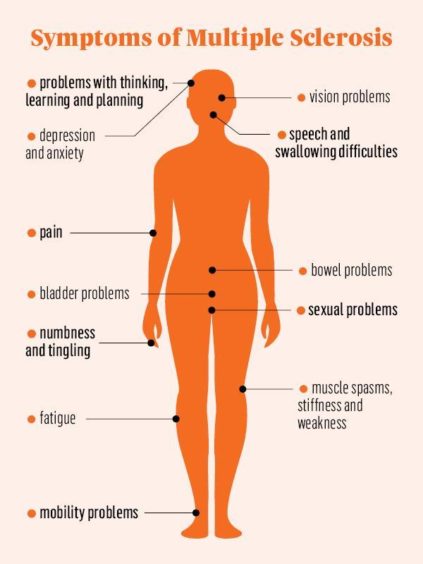A first-of-its-kind medication for multiple sclerosis has been hailed as a way to stop patients getting “chained” to regular hospital visits.
Hannah Laycock, 39, was diagnosed with MS in 2013, and has to attend clinics every six weeks for treatment.
She says ofatumumab, approved for use in Scotland this week, will be key to giving sufferers like her greater freedom and independence.
Also known as Kesimpta, it involves self-administered monthly injections to slow the effects of MS.
Figures published on Tuesday showed 450 new patients were diagnosed with the condition in Scotland in 2020. The country has the second-highest rate of MS in the world.

No ‘one size fits all’ treatment
Hannah says the new treatment will offer people greater flexibility for managing MS symptoms.
For the Forres-born photographer and student association worker, it causes balance and bowel issues, and numbness from the waist down.
“Often people with MS describe themselves as a snowflake, because each one is unique,” she said.
“We might have overlapping experiences but we’re all unique in terms of what we’re dealing with on a daily basis.
“Everyone responds to treatment differently, so one doesn’t fit all.
“This provides more choice for people living with MS, and makes it much more flexible for them.”

How does ofatumumab work?
MS is a condition where the immune system mistakenly attacks the brain, spinal cord or nervous system – potentially leading to serious disability.
Ofatumumab uses antibodies to kill or slow down these attacking cells, and is the first treatment of its kind to be approved for home use.
Patients using it will have injections once a week for three weeks, before switching to a once-monthly jab “from the comfort of their own homes”.
Talk from artist @HannahLaycock about her work and about living with the uncertainty of #MS opens the #PortraitsOfTheBrain workshop at the Anne Rowling Clinic #sciart @The_MRC @EdinburghBQ @EdinUniMedicine pic.twitter.com/PCLiOpZNEv
— CRM Edinburgh (@crm_edinburgh) September 26, 2018
Treatment offers ‘freedom’ for patients
Hannah, who uses her photography to raise awareness of MS, said: “Ofatumumab is self-administered, so you inject yourself at home, which makes it far more flexible for people.
“They don’t have to go into hospital for their treatment, which is something I have to do.
“It means people aren’t as chained to hospital appointments as you are for others, like the one I take.
“You have a bit more freedom and independence – and a feeling you’re more able to manage it by yourself.”
Morna Simpkins, director of the MS Society Scotland, which provides support to people throughout the country, said: “MS is relentless, painful and disabling, and this treatment increases the options for people to manage their condition and help prevent symptoms.”
